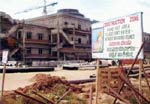|
The Divine Will
The story of how the Bangalore facility
was put up
by
Satish Nayak
The author was involved in the setting
up of the project
 When
a project is the result of a Divine Will, normal human limitations
and norms do not seem to apply to its execution. The speed
and mode go beyond credible human limits and the presence
of the Divine is made evident at every stage. When
a project is the result of a Divine Will, normal human limitations
and norms do not seem to apply to its execution. The speed
and mode go beyond credible human limits and the presence
of the Divine is made evident at every stage.
It was at the end of May 1999 that the Government
of Karnataka requested Baba to accept the grant of the 52
acre plot of land on which the Sri Sathya Sai Institute of
Higher Medical Sciences has been constructed. All procedures
were completed in time and it seemed the Government's red
tape was on a 'double fast-forwarded'! On Sunday August 8,
1999, with Baba's blessings, a ceremony happened at the South
West corner of the plot, when devotees and volunteers joined
in a prayer session.
The formal 'Bhoomi Pooja' [ceremony of beginning a construction]
and the laying of the north-east corner foundation stone were
carried out on Thursday September 2, 1999. The doyen of the
trust's construction engineers, Col S P Joga Rao was there
to cut the first sod.
In a project of this size, in the
normal course, the following minimum steps would have
been taken in sequence:
- Concept
- Architectural and functional designs and drawings
- Structural specifications, designs and drawings
- Project estimates
- Tendering and contracting
- Mobilisation and start of execution
All these activities were telescoped, and
many of them were carried out in parallel. A good part of
these  activities
continued during the execution phase of the project also.
This was possible by the divinely inspired spirit of cooperation
among the consultants, architects, contractors and suppliers,
ail of whom took on the project as a joint and a united endeavour.
Each party involved had, no doubt, its own limited objectives,
but the one over-riding objective was to please Baba by completing
the work to the required standard within the specified time.
There was a lesson that all those involved learnt: Unity in
Diversity i.e., diverse individual objectives, but one sole
unified over-riding objective can produce a synergy, which
can extend usually accepted limitations beyond expectations. activities
continued during the execution phase of the project also.
This was possible by the divinely inspired spirit of cooperation
among the consultants, architects, contractors and suppliers,
ail of whom took on the project as a joint and a united endeavour.
Each party involved had, no doubt, its own limited objectives,
but the one over-riding objective was to please Baba by completing
the work to the required standard within the specified time.
There was a lesson that all those involved learnt: Unity in
Diversity i.e., diverse individual objectives, but one sole
unified over-riding objective can produce a synergy, which
can extend usually accepted limitations beyond expectations.
Two prime contractors were chosen: one for the main hospital
complex and the other, for the residential complex. For the
main hospital complex, under the prime contractor, there were
as many as 21 nominated subcontractors in 29 contracts, in
addition to a myriad of other sub-contractors. Directly contracted
suppliers of materials and equipment numbered 421. Inputs
from all these sources had to be received strictly in time
and order of sequence so that the project schedule could be
maintained . One could see the
commitment of all these parties to the common cause; each of them
gladly bent over backward to fulfil their obligations. Such
commitment, one could clearly see, was possible only because
the Divine Hand was guiding them.
During price and schedule negotiations with all these diverse
parties coming from all over India and abroad and belonging
to various religions, one could sense and see a common theme:
they wanted to participate in this unique humanitarian endeavour,
even if it meant foregoing some profit, or going that extra
mile to meet the requirements of the project. There were, no
doubt, humanly created problems like strikes, transport problems
and power shortages in various parts of the country from where
items had been sourced, but none of them were such that could
not be compensated by human effort, aided by Baba's Grace. There
was hardly a case where alternative sourcing had to be done
to cover contract failure.
It was a case of: 'Without God on our side,
we are nothing; with God on our side, we are everything'.
|